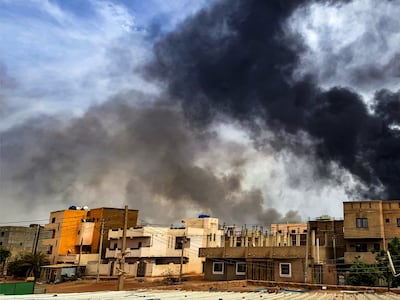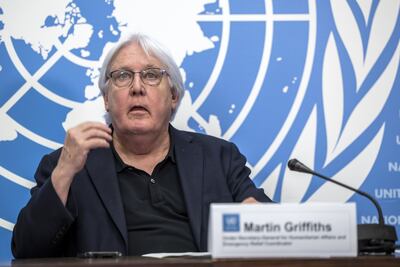The Sudanese army and the rival paramilitary Rapid Support Forces resumed talks on Thursday in Jeddah, in a renewed attempt to find a solution to their ruinous six-month war, responsible for one of the world's worst humanitarian crisis.
As the talks were set to begin in the Saudi Arabian city, the RSF announced its fighters had taken control of an army base in Nyala in southern Darfur, Sudan's second largest city after Khartoum, the capital.
Many Sudanese are pinning much hope on the negotiations recapturing the world's attention, which has been focused on the Gaza war in the past few weeks.
"I swear to God that we in Sudan support the cause of the Palestinians and our hearts are with our brethren in Gaza, but we also need the world to look at us a little," said Shaza Ibrahim, a tax department employee who fled the fighting in her native Khartoum and now lives in Nile River state to the north.
"We have been hurting so much."
Others believe it maybe too late for Sudan.
"They [the warring parties] failed to win the war and now they are going back to Jeddah after they displaced us, destroyed the country and crippled all essential services," said Abdul Rahman Al Sheikh, another former Khartoum resident who now lives in Kordofan in the west of Sudan.

The capture of the Nyala garrison, home to the army's 16th Infantry Division, means the city and its population of 4 million is almost entirely under the control of the RSF, which already has near total control of Khartoum.
It follows days of intense fighting, in which the RSF said more than 2,000 army troops were killed and a host of military equipment seized.
The army did not immediately comment on the capture of its Nyala base.
The latest triumph by the RSF, whose forerunner is a notorious Darfur militia Janjaweed, will likely strengthen its negotiating position in Jeddah.
It accuses the Sudanese army of forging an alliance with Islamic extremists loyal to the regime of dictator Omar Al Bashir, toppled in 2019 after 29 years in power.
The war between the army and RSF is essentially a struggle for military and political supremacy between army chief Gen Abdel Fattah Al Burhan and his one-time ally, now deputy RSF commander, Mohamed Dagalo.
The two generals staged a coup two years ago that toppled a civilian-led government that had been expected to run the country until it transitioned into a democratic rule.
The war, which has devastated Khartoum and spread to Darfur and Kordofan in the west, has killed nearly 10,000 people and displaced 5.6 million, the majority of whom have found refuge in neighbouring nations. The war has also hammered the country's already crumbling infrastructure, with millions now facing hunger and 80 per cent of the nation's health facilities shut down.

Six months into the conflict, UN humanitarian chief Martin Griffiths said "basic services are crumbling", disease outbreaks are "stalking the country" and "aid workers continue to be stymied in reaching people in need".
US officials said the Jeddah talks would aim for a ceasefire, though it was premature to discuss any lasting political solution.
"The new round will focus on ensuring unhindered humanitarian access and achieving ceasefires and other confidence-building measures," a State Department official said.
Another official in Washington said the US was hoping for a "constructive spirit" in the talks, saying "there is no acceptable military solution to this conflict".
Early in the conflict, the US and Saudi Arabia had mediated a series of ceasefires between the army and the RSF but each collapsed or was not observed diligently. Frustrated by the apparent lack of desire by the warring sides to reach a sustainable truce, Washington and Riyadh suspended the Jeddah process in the summer and the two sides continued to fight for military supremacy.
That attitude appears to have endured.
In a statement, the army said it had accepted the invitation to return to the talks because it believed it was one of the means by which to end the conflict. However, it added: "The resumption of negotiations does not mean a halt of the national battle of dignity, for the defeat of the rebel militia."

